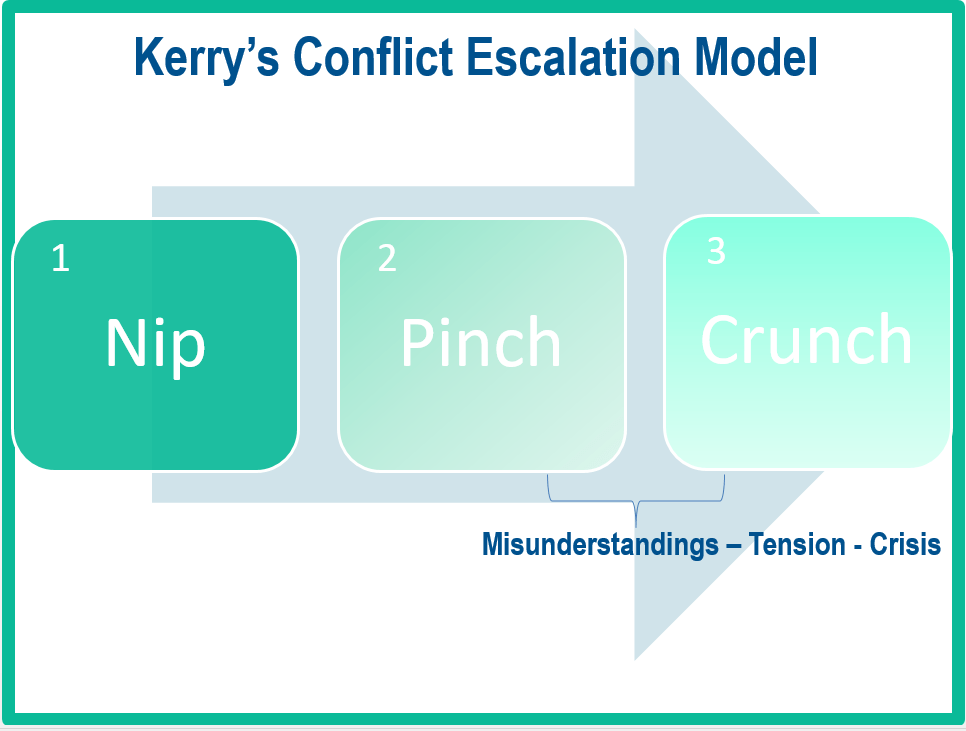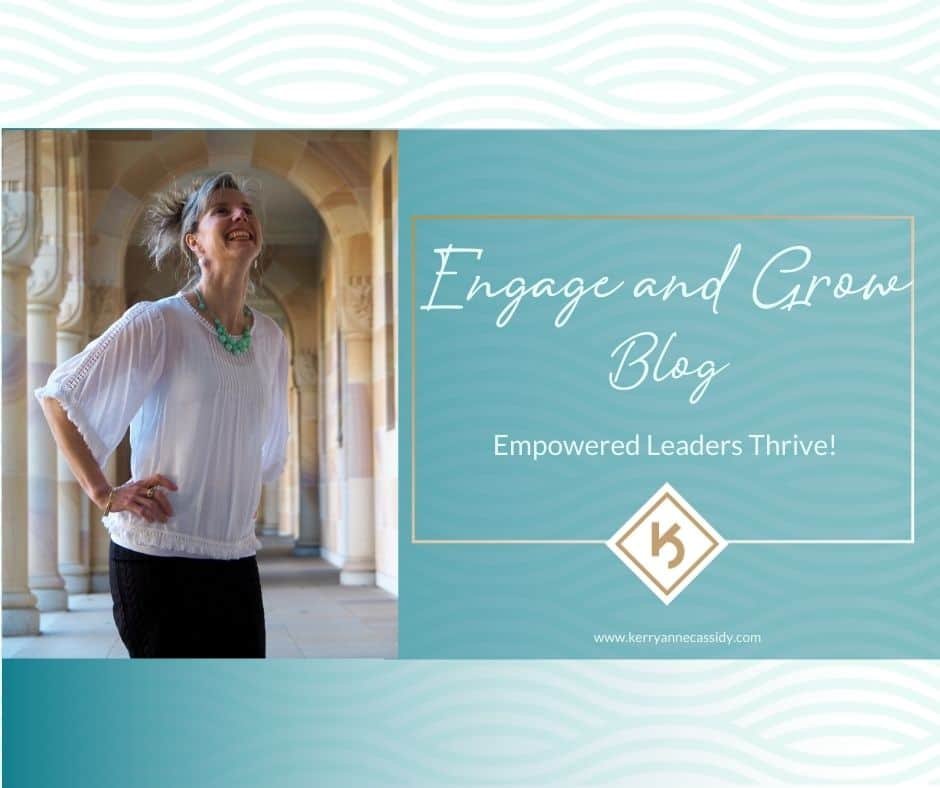Have you got a difficult conversation with a person in your workplace right now that you're avoiding?
If so, you are not alone.
90% of the classes I teach answer YES when I ask this question.
Why Then Is It So Difficult To Deal Directly with Conflict?
There are a few reasons why conflict is not easy. Let's look at the most common ones....
- It makes us feel uncomfortable - our brains are set for threat and a conflict situation has the potential for discomfort on a large scale, if it goes wrong!
- We are wired for social which means that conflict can get in the way of being accepted and acceptable to others if we don't deal with it effectively
- When conflict arises, our limbic brain takes charge and it sends a signal to our brain to either: fight, flee or freeze. None of these reactions are conducive for logical or sound reasoning which is required to review the evidence and make choices for win-win. So, it's easier for us to flee from conflict rather than interrupt our own patterning.
Why Do We Need to Deal with Conflict Right Away?
Conflict once it has started, has a certain energy to it. And for those of you who understand energy, you know that energy remains in the world unless we do something about it.
In the case of conflict situations we need to:
- Recognise that energy has power
- De-escalate or reduce the effects of this energy in both the body, your brain and emotions
So that we can get back our ability to think through the situation from a fact-based and logical perspective so that we don't "lose it". When you "lose it" you have in effect lost your ability to solve the problem that has arisen as a result of the conflict.
And, in my experience, once this happens, you often say and do things that you later regret.
The Escalation of Conflict: From a Nip to a Crisis
Typically what happens in a conflict situation, is that it starts off quite innocuously.
One: A Nip
I call this first stage of conflict, a nip and what I mean is best explained through an example.
You are in a meeting with John, Mary, Paul, Angelo and Sally. You and Sally, your colleague have been working on a project and you are going to be standing up in today's meeting and sharing back with the team what you've done.
As you are delivering this presentation, you notice that Sally's head is down, and she is scowling as you are delivering your message. Because you know Sally is a very serious type and given to total focus on something, you don't give it too much thought. Although you may have a passing thought about what is going on with Sally, it's not a big enough deal for you to actually say anything at that point.
Both of you go in the opposite direction once that meeting is over.
So I call that a nip, And, usually I'd suggest that you leave "nips" alone unless something else happens. This way, you don't over-react and become overly sensitive to situations.
Two: Pinch
If there is a conflict in the workplace, then it will escalate.
Let's go back to our example.
Fast forward two weeks. You and your team are back in the same meeting. This time round when you are delivering your message, you notice that not only is Sally scowling when you are presenting, but she's also now writing down on her notepad and passing the notepad to Jess to her right and having a chat with her about what looks to be your part of the presentation.
At this point, I call this a pinch because this pinch is backed up by another situation two weeks earlier. You now have two situations that have occurred that indicate that there is something that may be wrong.
If you leave this situation, which typically might happen if you are conflict averse, the situation won't go away.
You can't avoid it.
You can't pray and hope it'll just disappear magically.
It will escalate.
Three: Misunderstandings
Sadly, you are now seeing this person through the lenses of your misunderstanding, which means that you will not be able to take information on board appropriately about them.
So you'll be seeing them through the lens of what I call your "misunderstandings".
And the way that our brains work is that they will pick up any kind of incongruence in the way that you're speaking to or dealing with them.
This shows up in your words, tone of voice or your body language.
They may not be able to put their finger on what's "off" in your delivery, but they'll pick it up alright and then they will also start to see you through the lenses of their perception, which also leads to greater misunderstandings.
Four: Tension
If you don't deal with the conflict at this last level you move up to the next level.
In level four, the two of you will now be facing off around each other, walking on eggshells because of the tension in the room and between the two of you.
Tension becomes more difficult to deal with just between the two of you due to the amount of history and baggage that you start to store up about each other. You are not able to be objective about the other person because your "threat response" has created this person as a "enemy" who is dangerous to your wellbeing and safety.
Five: Crisis
And if you don't deal with tension, typically it's going to escalate and you and your "combatant" will land up in a crisis.
A crisis sadly is the end of something. So it may be the end of goodwill between the two of you.
It could also be equally the end of the trust between the two of you.
It could be the end of a career and at its absolute worst, the end of life.
So, allowing conflict to escalate to a crisis is not the best strategy.
In Summary
Conflict has its own energy which needs to be recognised and diffused before it escalates and gets out of control.
Being conflict averse is a strategy which may work in the early stages of conflict but will not serve you if you continue to ignore it.
So, if you have a conflict situation that may be blossoming, I would highly encourage you to have the conversation sooner rather than later.
Questions to Consider regarding conflict:
- At what level is your conflict?
- Who can you speak with who is objective, neutral and not part of the "drama"?
- What strategies could you employ to keep yourself calm and in control during the interaction?
- What do you want to say to the other person - and how can you make sure you remain respectful and professional?
Drop me your thoughts on conflict and how its affected you in the workplace.
Until next time time, I'll
See you at the top!
Kerry Anne
PS.
Conflict is a normal part of life.
The term, conflict means simply, "A difference of opinions"
Why then do we tend to struggle so much with conflict?
The reasons are many and can be complex.
That's why I have created a specially formulated online programme that helps to not only answer the questions surrounding conflict but also gives you tools and strategies to overcome it in an emotionally intelligent way.
Along the way, we explore:
- Why conflict is healthy and how to use the 4 Keys for Successful Conflict so that you can get more effective in managing and working through conflict
- The subconscious biases driving your conflicts, the costs of these and how to rise above the emotional outbursts that hold you back from successful conflict management
- A model for the mind to move you past your blocks and triggers, harness the skill-set of emotional intelligence and a process for managing conflict and difficult people
- How to develop the 6 Skills of EI and learn how to use the 12 tools of each to grow your confidence and get better results, every time!
- The reality of difficult people versus difficult behaviours, and learn how to identify the different people styles using DISC (behavioural profiling) and leverage these for optimum success in conflict!
If conflict is holding you back, find out how I can help you build your confidence and overcome the blame game to get positive results




